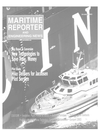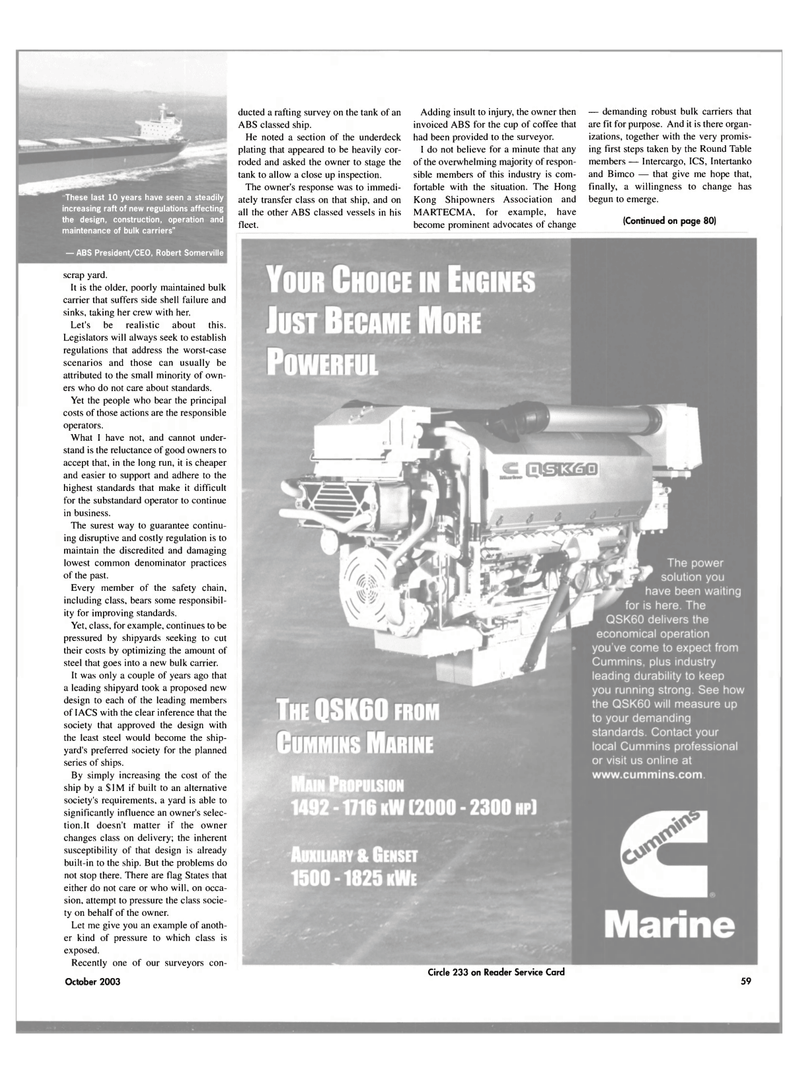
Page 61: of Maritime Reporter Magazine (October 2003)
Read this page in Pdf, Flash or Html5 edition of October 2003 Maritime Reporter Magazine
"These last 10 years have seen a steadily increasing raft of new regulations affecting the design, construction, operation and maintenance of bulk carriers" — ABS President/CEO, Robert Somerville scrap yard.
It is the older, poorly maintained bulk carrier that suffers side shell failure and sinks, taking her crew with her.
Let's be realistic about this.
Legislators will always seek to establish regulations that address the worst-case scenarios and those can usually be attributed to the small minority of own- ers who do not care about standards.
Yet the people who bear the principal costs of those actions are the responsible operators.
What I have not, and cannot under- stand is the reluctance of good owners to accept that, in the long run, it is cheaper and easier to support and adhere to the highest standards that make it difficult for the substandard operator to continue in business.
The surest way to guarantee continu- ing disruptive and costly regulation is to maintain the discredited and damaging lowest common denominator practices of the past.
Every member of the safety chain, including class, bears some responsibil- ity for improving standards.
Yet, class, for example, continues to be pressured by shipyards seeking to cut their costs by optimizing the amount of steel that goes into a new bulk carrier.
It was only a couple of years ago that a leading shipyard took a proposed new design to each of the leading members of I ACS with the clear inference that the society that approved the design with the least steel would become the ship- yard's preferred society for the planned series of ships.
By simply increasing the cost of the ship by a $1M if built to an alternative society's requirements, a yard is able to significantly influence an owner's selec- tion.It doesn't matter if the owner changes class on delivery; the inherent susceptibility of that design is already built-in to the ship. But the problems do not stop there. There are flag States that either do not care or who will, on occa- sion, attempt to pressure the class socie- ty on behalf of the owner.
Let me give you an example of anoth- er kind of pressure to which class is exposed.
Recently one of our surveyors con-
October 2003 ducted a rafting survey on the tank of an
ABS classed ship.
He noted a section of the underdeck plating that appeared to be heavily cor- roded and asked the owner to stage the tank to allow a close up inspection.
The owner's response was to immedi- ately transfer class on that ship, and on all the other ABS classed vessels in his fleet.
Adding insult to injury, the owner then invoiced ABS for the cup of coffee that had been provided to the surveyor.
I do not believe for a minute that any of the overwhelming majority of respon- sible members of this industry is com- fortable with the situation. The Hong
Kong Shipowners Association and
MARTECMA, for example, have become prominent advocates of change — demanding robust bulk carriers that are fit for purpose. And it is there organ- izations, together with the very promis- ing first steps taken by the Round Table members — Intercargo, ICS, Intertanko and Bimco — that give me hope that, finally, a willingness to change has begun to emerge. (Continued on page 80)
Circle 233 on Reader Service Card 59

 60
60

 62
62
